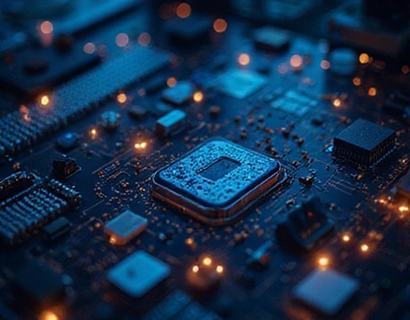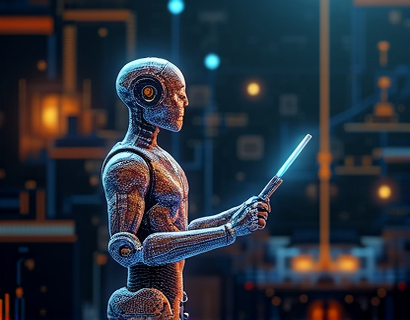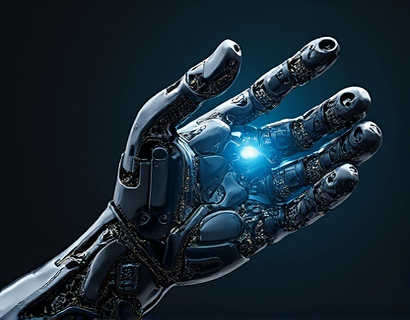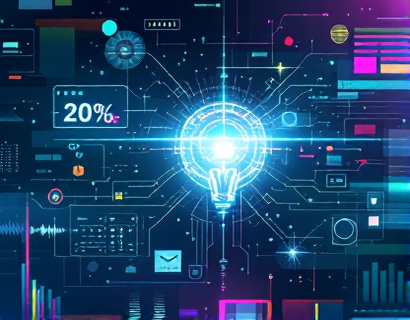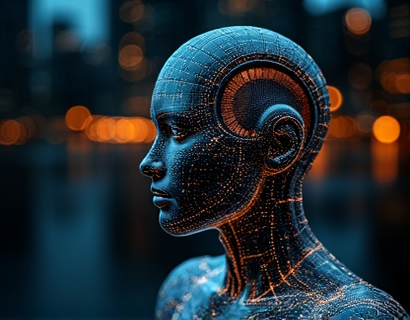AI and Crypto: Transforming Digital Finance Through Innovative Tech Solutions
The intersection of artificial intelligence (AI) and cryptocurrency is revolutionizing the landscape of digital finance. This fusion is not just a technological curiosity but a transformative force that is redefining how we interact with financial systems, enhancing security, efficiency, and user experiences. As we delve into this topic, it's essential to understand the foundational technologies and their individual impacts before exploring the synergistic effects they create when combined.
Foundations of AI and Cryptocurrency
Artificial intelligence, a branch of computer science, focuses on creating systems that can perform tasks requiring human intelligence, such as learning, reasoning, and self-correction. AI technologies include machine learning, natural language processing, and computer vision, each playing a crucial role in various applications.
Cryptocurrency, on the other hand, is a digital or virtual currency that uses cryptography for security and operates on a decentralized network, typically a blockchain. Bitcoin, launched in 2009, was the first and most well-known cryptocurrency, but thousands of others have since emerged, each with unique features and purposes.
The integration of AI into cryptocurrency is multifaceted, impacting development, trading, security, and user experience. AI algorithms can analyze vast amounts of data to predict market trends, optimize trading strategies, and enhance the security of blockchain networks.
Enhancing Trading and Market Analysis
One of the most visible impacts of AI in cryptocurrency is in trading and market analysis. AI-driven trading bots use machine learning to analyze historical data, identify patterns, and make informed trading decisions. These bots can operate 24/7, executing trades at optimal times to maximize profits and minimize losses.
Moreover, AI enhances market analysis by providing deep insights into market trends and sentiment. Natural language processing (NLP) techniques analyze news articles, social media posts, and other textual data to gauge public sentiment towards specific cryptocurrencies. This sentiment analysis can predict price movements, giving traders a competitive edge.
For instance, AI models can process real-time data from various sources, including financial news, social media, and market reports, to generate trading signals. These signals can be used by both automated trading systems and human traders to make more informed decisions.
Improving Security and Fraud Detection
Security is a paramount concern in the cryptocurrency space, and AI plays a crucial role in enhancing it. Blockchain, the underlying technology of cryptocurrencies, is inherently secure due to its decentralized and immutable nature. However, the ecosystems surrounding blockchain, such as exchanges and wallets, are vulnerable to various attacks.
AI-powered security solutions can detect and prevent fraudulent activities more effectively than traditional methods. Machine learning algorithms can identify unusual patterns and anomalies in transaction data, flagging potential security breaches in real-time. This proactive approach helps in mitigating risks and protecting user assets.
Additionally, AI can enhance the authentication process in cryptocurrency transactions. Biometric verification, powered by AI, offers a more secure and convenient way to authenticate users. This technology can significantly reduce the risk of unauthorized access and fraud.
Optimizing Blockchain Performance
Blockchain technology, while revolutionary, faces challenges related to scalability and efficiency. Transaction processing times and fees can be high, limiting the practical use of cryptocurrencies for everyday transactions. AI can help optimize blockchain performance by addressing these issues.
One approach is to use AI to manage and optimize the consensus mechanisms of blockchain networks. Machine learning algorithms can analyze network data to suggest improvements in consensus algorithms, reducing energy consumption and increasing transaction speeds. For example, AI can help transition from energy-intensive proof-of-work (PoW) to more efficient proof-of-stake (PoS) mechanisms.
AI can also enhance the development of layer 2 solutions, which aim to improve blockchain scalability by processing transactions off the main chain. Machine learning models can optimize the routing of transactions and the management of sidechains, ensuring smoother and faster transaction processing.
Enhancing User Experience
The user experience in the cryptocurrency space can be complex and intimidating for newcomers. AI can simplify this experience by providing intuitive interfaces and personalized services. Chatbots powered by natural language processing can offer 24/7 customer support, answering queries and guiding users through the process of using cryptocurrencies.
Personalization is another area where AI shines. By analyzing user behavior and preferences, AI can recommend tailored services and products. For example, a cryptocurrency exchange can use AI to suggest investment strategies based on a user's trading history and risk tolerance. This personalized approach enhances user satisfaction and engagement.
Furthermore, AI can improve the accessibility of cryptocurrency services. Voice-activated assistants and gesture-based interfaces can make it easier for users to interact with crypto platforms, breaking down barriers for those less familiar with technology.
Innovative Financial Products and Services
The combination of AI and cryptocurrency is giving rise to innovative financial products and services that were previously unimaginable. Decentralized finance (DeFi) is a prime example, where AI is used to create automated lending, borrowing, and yield farming platforms.
AI-driven DeFi protocols can assess creditworthiness more accurately, reducing the need for traditional credit checks. This democratizes access to financial services, allowing more individuals to participate in the crypto economy. Additionally, AI can optimize portfolio management in DeFi, dynamically adjusting asset allocations to maximize returns and minimize risks.
Another innovative service is AI-powered insurance products for cryptocurrency holdings. These insurance solutions use AI to assess risk factors and provide tailored coverage, offering peace of mind to crypto investors and users.
Challenges and Considerations
While the integration of AI and cryptocurrency offers numerous benefits, it also presents challenges that need to be addressed. One major concern is the regulatory landscape. The rapid evolution of AI and cryptocurrency has outpaced regulatory frameworks, leading to uncertainty and potential legal risks.
Another challenge is the ethical use of AI. Ensuring that AI systems are transparent, fair, and free from bias is crucial. The crypto community must prioritize ethical AI practices to maintain trust and integrity in the ecosystem.
Technical challenges, such as the computational resources required for AI models, also need attention. As AI models become more sophisticated, the demand for processing power and data storage increases, which can be costly and environmentally impactful.
Future Prospects
The future of AI and cryptocurrency is bright, with ongoing advancements promising even more transformative applications. The development of more efficient AI algorithms and the adoption of sustainable blockchain technologies will further enhance the synergy between these fields.
One exciting area is the integration of AI with quantum computing. Quantum computers have the potential to solve complex problems that are currently infeasible for classical computers, including certain AI tasks. This combination could lead to breakthroughs in cryptography, optimization, and data analysis, pushing the boundaries of what's possible in digital finance.
Moreover, the rise of central bank digital currencies (CBDCs) presents an opportunity for AI and cryptocurrency to collaborate with traditional financial systems. AI can help central banks design and implement CBDCs that are secure, efficient, and user-friendly, bridging the gap between centralized and decentralized finance.
In conclusion, the fusion of AI and cryptocurrency is not just a technological trend but a fundamental shift in how we approach digital finance. By leveraging the strengths of both fields, we can create more secure, efficient, and user-friendly financial systems. As this synergy continues to evolve, it will undoubtedly shape the future of technology and finance, offering endless possibilities for innovation and growth.



